#song of god krishna
Video
youtube
సృష్టి క్రమము! భగవద్గీత Bhagavad Gita Ch 10:6–10 MPlanetLeaf
#youtube#సృష్టి క్రమము#భగవద్గీత#bhagavad gita#bhagavadgita#bhagavadgītā#mplanetleaf#voice of maheedhar#bhagavad gita chapter 10#maheedhars planet leaf#bhagavad gita in telugu#lord krishna#vibhuti yoga#learn gita#word of god#song of god krishna#song of god#bhagavadgita telugu#bhagavat geeta#bhagavadgita audio#chandamama kathalu#bhagavadgita podcast telugu#bhagavadgita podcast#bhagavadgita audiobook telugu#bhagavadgita audiobook#free bhagavadgita audiobook#free bhagavadgita#bhagavad gita kathalu#free books#ebooks
2 notes
·
View notes
Text
Devi Song
#hindu#hinduism#spirituality#temple#shiva#hindu mythology#lordshiva#parvati#kailasa#krishna#kundalini shakti#shaktism#shakthi#shakti#har har mahadev#mahadev#mahakaal#mahakal#lord shiva#god songs#aigiri nandini
55 notes
·
View notes
Text

#Talk about parallels#They're literally the same#Ik The Song of Achilles is a retelling not actual Iliad#hindu mythology#greek mythology#mahabharata#illiad#the illiad#krishna x arjun#krishna and arjun#krishna#arjuna#hindu gods#the trojan war#trojan war#achilles x patroclus#the song of achilles#achilles#patroclus#tsoa#tsoa patrochilles#hindublr#desiblr#desi tumblr
41 notes
·
View notes
Text
Radhe Radhe ❣️❣️
#radhakrishna#radha#Krishna#krishna#serial#sumelika#sumedh mudgalkar#mallika singh#Mallika Singh#hindi#god#goddess#edit#zara zara#song#love
8 notes
·
View notes
Text
Mysterious ‘fairy circles’ identified at hundreds of sites worldwide, new study says
So-called fairy circles, or bare patches forming patterns that can span miles, are shown at the edge of the Namib Desert in Namibia.Thomas Dressler/imageBROKER/Shutterstock
By Mindy Weisberger, CNN
Updated 8:21 AM EDT, Thu September 28, 2023
Round discs of barren dirt known as “fairy circles” look like rows of polka dots that can spread for miles over the ground. The phenomenon’s mysterious…

View On WordPress
#Allah#alternative#analysis#ancient#animals#Jehovah#Jesus Christ#justice love liberty unity harmony God word holy bible care caring peace sanctuary salvation scales sight third eye#Krishna#love poem relationship boyfriend girlfriend rapper music song write writing english spanish soul#Travel#truth 435#Viral#Zoology
0 notes
Text
I can't believe that I forgot how much I love this song, but listening to it again reminded me of something else unrelated that made me emotional, and that is Janis Joplin - the entire first verse reminds me of her, actually, "Got to pay your dues if you want to sing the blues/And you know it don't come easy/You don't have to shout or leap about/You can even play them easy/Forget about the past and all your sorrow/The future won't last, it will soon be your tomorrow" because of her quote "People, whether they know it or not, like their blues singers miserable. They like their blues singers to die afterwards" and her song (which, I admit, was not written by her, but this song is SO quintessential Janis that it feels so much like her song) "Get it While You Can" with lyrics "Don't you know when you're loving anybody, baby/You're taking a gamble on a little sorrow/But then who cares, baby/'Cause we may not be here tomorrow, no."
#sorry not sorry to be a Janis Joplin fan first. I am. always :')#ALSO OMG I JUST READ THE BACKGROUND INFO ON HOW RINGO (and George) WROTE THIS SONG AND I'M CRACKING UP:#George suggested verse 3 be about God - Ringo protested. G then suggested Hare Krishna. R OBJECTED. then they settled on 'peace' 😂#but to finally agree on peace as the subject...how apt for Ringo since that's his main shtick these days. I wonder how influential#that seemingly small decision was for him in the long run? 🤔 but that's as far as I'm gonna go speculating here...#but NOW omg NOW that reminds me of Buffy Sainte-Marie since she sang 'Hey don't the wars come easy/Hey don't the peace come hard'!!!!!!#heehee I love making otherwise completely random connections between my faves. I think it might actually be a talent? LOL (jk)#Spotify
1 note
·
View note
Text

George Harrison remained an enigma to many people, even those who were close to him. For a man who lectured passionately about karma and the meaning of existence, he seemed self-protective and closed off. Witty when called upon, there were also moments when he could be quite boorish. Perhaps it was because he was only twenty years old when the Beatles became a global sensation. That might not seem particularly young in today’s world of social media fame, but at the time, it was uncharted territory for the kind of adulation he was experiencing.
It was also difficult living in the shadow of Paul and John. In the beginning, they were openly dismissive of him. Paul said he always thought of George as a little brother. At first, John pretended not to know his name and sardonically referred to him as “that kid’’. Ironically, one of George’s compositions, Something, became the most covered song in the Beatles catalogue.
This interview was conducted at George Harrison’s palatial home, Friar Park, in Henley-on-Thames, on November 5, 1980. George was gracious but cool. He made a pot of tea in the drafty, vast kitchen of his 120-room estate, and spent two hours lecturing about Transcendental Meditation and the details of a limited edition of his autobiography, I Me Mine, which is certainly how he must have felt getting out on his own.
In 2000, George was diagnosed with oropharyngeal cancer. George died on November 29, 2001, in the company of his wife, Olivia; his son, Dhani; musician Ravi Shankar; and Hare Krishna devotees who chanted verses from the Bhagavad Gita. He was 58 years old and left nearly $100 million in his will. George told Olivia that he didn’t want to be remembered for being a Beatle, he wanted to be remembered for being a good gardener.
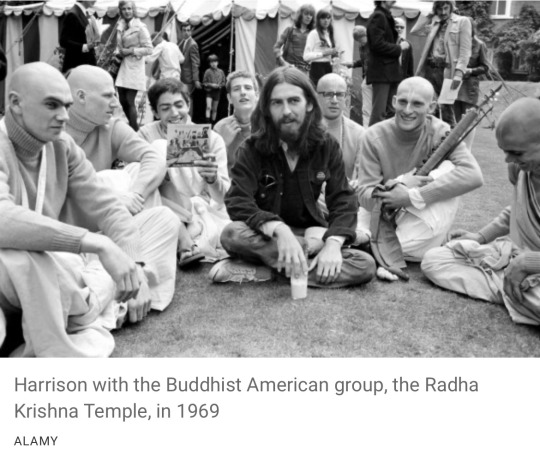
‘It was a transcendental experience that was beyond the mind’
On taking LSD
LSD was just such a violent, big experience. Before it I was totally ignorant, and afterward I knew I was totally ignorant and I was now on my way to having some sort of knowledge. I related it to the childhood experience of Catholicism and going to church on a Sunday and seeing all that phoney baloney. The moment I’d taken LSD, it just made me laugh because I understood it inside, just in a flash. I understood what the whole concept of God or religion was just by seeing it. I could see it in the grass in the trees.
It was an absolute truth; like a light going ching. I took three very powerful trips — big, very important — and then it left me a bit unsure because I had to try and figure something out. By that time I had gotten into Indian music and spent time in India, [and] there was so much about it that felt like home to me. Not the surface that you see — all this poverty and the flies and the shit everywhere — [it] went beyond all that. Smells in the atmosphere and the people’s attitude and the music, the food, the religion, everything about it … home.
‘I’d hear his voice wailing at five in the morning’
On the death of Brian Jones of the Rolling Stones
I liked Brian a lot, and later on, I realised it was probably because we were both Pisces. We both had similar natures. He was also similar in that he had a Keith and a Mick, whereas I had a John and a Paul. We both had that problem of two mighty egos to deal with in order just to try and survive. I was very susceptible to dope, and Brian [Jones] was even more susceptible. He’d come [to my house], and I’d just hear his voice wailing at like five in the morning: “George, Geeooorrgggeeee.” So I’d wake up, see what was going on, and I’d look out the window, and he’d be all white and just shattered walking around the garden — just looking for somewhere to be.
I would always meet him at that time of day and just try to calm him down. And I saw him a lot before he died in that sort of circumstance. The last time I saw him, I think, was when I’d been in hospital to have my tonsils out and he came to see me in hospital and the next week he was gone. He was like all of them who kicked the bucket — it was sad because there were too many pressures, really. Not just the pressure of being famous and having the press hounding you day and night and young fans hounding you day and night. Plus the drugs hounding you day and night.
‘F*** it — I could do better than that’
On his childhood inspiration, Cliff Richard
I remember being a kid of about twelve, dreaming of big motorboats and tropical islands and things which had nothing to do with Liverpool, which was dark and cold. I remember going to see Cliff Richard and thinking, f*** it — I could do better than that.
‘I think being Elvis was lonelier than being one of the Fab Four’
On fame — and Elvis Presley
We kept realising we were getting bigger and bigger until we all realised we couldn’t go anywhere —you couldn’t pick up a paper or turn on a radio or TV without seeing yourself. I mean, it became too much. We became trapped, and that’s why it had to end, is what I think … We were like monkeys in a cage. I think it was helped a bit by the fact that it was four of us, who shared the experience. I mean, there was more than four of us, there was Peter Brown and Brian Epstein, but there was only four of us who were actually the Fab Four — whereas Elvis had an entourage and maybe 15 guys, friends of his, but there was only one man having that experience of what it was like to be Elvis Presley. I think that was far lonelier than being one of the Fab Four because at least we could keep each other laughing or crying or whatever we did to each other. It was definitely an asset being in a group.
(source)
116 notes
·
View notes
Text
Krishna: a character adored for over two thousand years, revered as one of the most significant political masterminds of the ancient world with his words forming the philosophical core of the country today. Concurrently, he is the god shrouded in inimitable domesticity- as a friend, a lover, and a child. No other deity in the Hindu pantheon has probably achieved as dear a position in the hearts of people as this flute-wielding cowherd of Gokula.
For generations, he has shined as the muse of countless poetfolk, of unfinished business, of unspoken desires and of repressed lovers' qualms. In Meera's longing for her marble beloved, and in Kothai's dulcet dreams of a celestial wedding, Krishna blossoms not as a warrior, but rather as a confidante of young women- the keeper of all secrets.
Curse, o ye, this wedding of devotion,
For I was better off unmarried,
Writes the lovestruck Nawab Sadiq Hilm,
I was well enough at my mother's;
Oh, why did I pine for him?!
Who am I, or what: go ask Rizwan, the gatekeeper
For heaven has been rejected by my forebearers!
He says, in a nostalgic ode to the cowmaids from old tales. To the ones that massage the dust off their feet on Krishna's fevered forehead to soothe his illness, even as the apparent disrespect dooms their afterlives.
Jayadeva notes a more rugged form of Krishna, one that is almost hungry for love. His Radha smiles down upon Radharaman Dutta's kalankini. Of course, she would accept even infamy if it was in relation to her Krishna. However, in time, this epithet has been reclaimed as a celebration of the meteoric, tempestuous love that this unseemly duo had carved out for themselves of the pages of a mostly unwilling history.
Tagore's Krishna is mysterious, eagerly anticipated but rarely seen. Rather, here Radha's pining is crushing and all-encompassing, inherited from Chandidas' virahini. Radha's guttural desire to transform Krishna into herself, subjecting him to the same suffering that she undergoes as a woman in love with a furious ideology more than a man, reverberates eerily against the lighthearted cross-dressing tale of Surdas'.
As often as bards favour the songs extolling the love of the cowherd and the wedded maiden, Krishna's wives are seldom accorded any thought outside of Vasudeva's family tree. Their silence speaks to the stringent rules of a typical patriarchal household. Some of them do speak, and hence Satyabhama becomes conceited and Kalindi wayward. However, the mere few lines that they are mercifully allotted in the text are enough to speak to their resilience. The lines inadvertently hold up a window to the million unspoken words and unexchanged glances. It speaks to the long years, happy and sad. It speaks to the nights of waiting for the beloved to return. It speaks to the quiet lunches in curtained rooms and taste tests in the kitchen.
Each of Krishna's eight wives has their own life, and their own equation with Krishna. Each of their distinct personalities, coupled with their unique introductions to the prince has the potential to bring a distinct flavour to the story of Krishna, the statesman. The understanding that Krishna's heart belonged first to Vrindavana and then to his ambition, must have weighed somewhat on their hearts and yet, the choice to patch up the battle-hardened cowherd, after every blow, sans complaint, and send him out into the world as the architect of history, must have demanded restraint.
The distinct turn of events that brings each of the chief eight queens to Krishna's is quite interesting. Rukmini, the first, demonstrates heart, even if it is born out of desperation. Seizing control of her life, she sends a message, relying solely on rumours of his compassion. Her gamble yields returns manifold as Krishna not only rescues her from an unwanted marriage, but instates her as his chief consort, elevating her, alongside himself, to a divine status. Far from the impulsiveness of her youth, Pandhari's Rakhumai, astute beside her beloved, proudly bears a conch-shell, calling for harmony and community. In life as well, Rukmini brings to Krishna much needed stability, and oversees the blossoming of the city of Dwarika as well as Krishna's growing household.
Jambavati and Satyabhama are given in marriage to the prince by their respective fathers and do not seem to have much of a voice at the time. Jambavati fulfills an ancient destiny, a forgotten promise, then going on to mother the child that ultimately brings about the demise of the Yadava clan. Satyabhama, though often maligned with unfair accusations, is self-reliant. Making no attempt to hide herself from the eye of society, takes her rightful place beside Krishna, not on a throne, but by his side in battlefields. Kalindi however, is an extremely interesting character in Krishna's story. Enmeshed between mortal and divine, she exists as neither. Chancing upon the prince, she unabashedly declares her intentions to be married, and yet she is uncharacteristically silent after her marriage. Lakshmana and Mitravinda, are both won in conquest. They might have been able to sympathize with Rukmini, given their kin had turned against them, on account of their choice of a life partner. Bhadra, on the other hand, has no fancy contests to boast of, or an adventurous rescue. She marries Krishna at the behest of her brother, the only highlight being the arduous journey she undertakes from Kekaya to Dwarika.
After their marriages, these women practically disappear from the narrative until their last moments. We can assume that they were all presumably content with a life outside the spotlight. One can only hope to be privy to their lives after marriage, to know their dreams, nightmares and daily chores. They enter Krishna's life at crucial junctions, and I choose to believe they each had a unique effect on Krishna's worldview, bringing with them a fresh outlook into the mostly stagnant golden city.
#krishna#radha#original writing#mahabharata#hindu mythology#rukmini#satyabhama#kalindi#desi tumblr#ehi murare#prologue#jambavati#mitravinda#lakshmana#bhadra#nagnajiti
146 notes
·
View notes
Photo
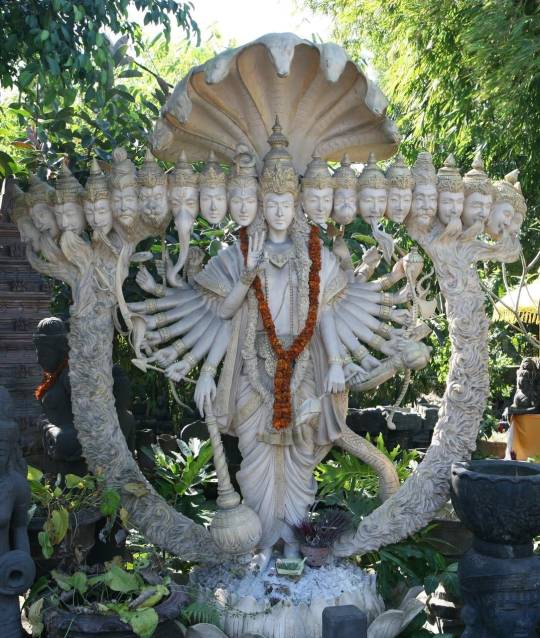
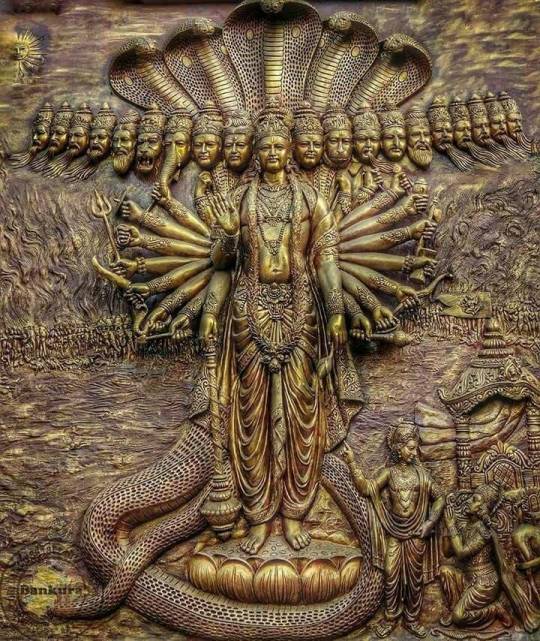
Vishvarupa "Universal-form"
Vishvarupa ("Universal form", "Omni-form") also known popularly as Vishvarupa Darshan, Vishwaroopa and Virata rupa, is an iconographical form and theophany of the Hindu god Maha Vishnu or his avatar Krishna. Though there are multiple Vishvarupa theophanies, the most celebrated is in the Bhagavad Gita, "the Song of God", given by Krishna in the epic Mahabharata, which was told to Pandava Prince Arjuna on the battlefield of Kurukshetra in the war in the Mahabharata between the Pandavas and Kauravas. Vishvarupa is considered the supreme form of Vishnu, where the whole universe is described as contained in him.
505 notes
·
View notes
Text

Photo by Gary Wright.
“People take their concept of religion and put it on me. All that orthodox training, heaven and hell, black and white, fear — I’ve always been against that: when I went to church and saw people putting on their best suits, pretending to be nice, then going home and beating up their old ladies, I thought it was bullshit.” - George Harrison, Hit Parader, May 1977
“[Swami Vivekananda said] ‘If there’s a God you must see him and if there’s a soul we must perceive it - otherwise it’s better not to believe. It’s better to be an outspoken atheist than a hypocrite.’ All my early life they’d tried to bring me up as a Catholic, but I wasn’t really into that. The whole ‘Christian’ attitude (and I say ‘Christian’ in inverted commas, because there are a lot of people who represent themselves as Christians who aren’t — who don’t really, to my mind, have the franchise on Christ, and are not necessarily representative of what He was trying to say) seemed to be telling you to believe what they’re telling you and not to have the direct experience.” - George Harrison, The Beatles Anthology
Q: “Did he officially become a Hare Krishna?”
Olivia Harrison: “No. He didn’t officially become anything. And you know, many groups would claim him. He just had a nice experience with them, he really loved the idea of Lord Krishna. And I don’t just mean the idea, but actually the deity; you can relate to that. And mantras. He understood mantras; you know, that vibration encased in a syllable that has some, some power.”
Q: “That’s almost like the hook of a song, isn’t it?”
OH: “Yeah, absolutely. And it’s scientific, you know, I mean, a mantra is chanted in a certain meter. The space between the syllables is also part of that mantra. And it is a certain vibration, it has a certain effect. And he was very much into that.” - WNYC, November 4, 2011 (x)
#George Harrison#quote#quotes by George#quotes about George#Harrison spirituality#George and Olivia#always relevant#fits queue like a glove
59 notes
·
View notes
Video
youtube
Destruction of Delusion భౌతిక జ్ఞానం | భగవద్గీత Bhagavadgita Ch 18:71–74
#youtube#delusion#heavenly delusion#Destruction of Delusion#భౌతిక జ్ఞానం#భగవద్గీత#bhagavad gita#bhagavadgita#bhagavadgītā#bhagavadgeeta#bhagavad gita chapter 18#maheedhars planet leaf#bhagavad gita in telugu#lord krishna#Bhagavad Gita Part 138#srimad bhagavadgita#learn gita#word of god#song of god krishna#bhagavadgita telugu#bhagavadgita audio#voice of maheedhar#bhagavadgita podcast telugu#bhagavadgita podcast#bhagavadgita audiobook telugu#bhagavadgita audiobook#life changing lessons from bhagavad gita#maheedhar bhagavadgita
0 notes
Text
Tere Rang
“It’s going to be a Krishna song for the dance competition once again, right?” said, Ananya, inserting the last juda pin in her friend, Vilasini’s hair.
Vilasini, a seventeen-year-old science student in class eleven was all set for the senior’s inter-school dance fest that was to be held at her school. She wore a dark blue lehenga with gold embroidery that shimmered under the lights. Her best friend, Ananya, had taken the responsibility of getting Vilasini ready for the competition because, she was good at stage makeup and hairstyling, a skill, Vilasini was yet to acquire perfectly.
“You know me well, Ananya,” said, Vilasini, her face donning a faint shade of the setting sun.
Ananya looked at her friend’s bashful face, whose eyes had immediately moved down to the floor at the mention of Krishna, the god, the charmer of hearts from a bygone era. As she braids flowers into Vilasini’s hair, she wonders how did a girl from today’s time fall in love with a God when people barely utter a prayer under their breaths.
Krishna… the name itself was beautiful. Though Ananya was not that much of a believer in gods and goddesses, she happily supported her friend in her beliefs. For Ananya, Krishna was not a God, but a great historical character, an important figure to learn from especially in today’s time. Sometimes she offered flowers to the Krishna murti at her house after a lot of pestering from her mother, but she would spend a lot of time reading stories and articles about him.
Vilasini, on the other hand appeared to be a modern generation saint. She spoke softly and so slowly in a gentle voice that made everyone feel as if a divine aura surrounded them. For Vilasini, Krishna was her life force, her breath, and her purpose for living. She woke up with Krishna’s name on her lips and welcomed sleep with only Krishna’s name on her lips.
“You remind me of the saint poet, Meera, do you know?” Ananya said, after finishing her work on Vilasini’s hair left beautifully open with a half bun pinned with jasmine and rose flowers.
Vilasini turned her head from her reflection towards her friend. “No one can be Meerabai in this generation. Not even me, even if I try to.”
Ananya smiled and shook her head. Checking the last details of Vilasini’s makeup and hair, she said, “Fine, but I am damn sure, you will look the prettiest contestant there.”
Smiling, Vilasini replied, patting the creases on her skirt, “All thanks to my talented sakhi here.”
“I like the way the word sakhi sounds. So gentle and beautiful.”
***
Vilasini’s performance was the last one in the list. Ananya had decided to stay with her friend instead of joining the audience just for the sole reason of helping her friend for any last-minute mishaps and to maintain her friend’s confidence.
Tapping her feet, Vilasini asked, “Will I be able to perform well? There have been so many good performances before me. Also, I have a very simple song. Will anyone be interested in watching mine anymore after all the splendid presentations?”
Ananya looked at the boy dancing on the stage on Hai Rama in a bolly-hiphop fusion style. Turning her gaze towards her friend, she said, “Sometimes, the most simple things are the most thoughtful ones. Have faith in your practice and Krishna. And just like you always do, dance for your Krishna, for him alone.”
A minute later, the boy was done with his performance, and the audience erupted in cheers and applause. The host, one of Vilasini’s classmates, then announced her arrival on stage and signalled at the small back room upstairs to start playing Vilasini’s music.
“All the best, Vilasini. Go win the stage and your dear Kanha’s heart,” wished Ananya.
Vilasini nodded at her friend and muttered Krishna’s name under her breath as she took a twirl to enter the stage on the beats of the sitar.
Alai payuthey kanna en manam miga alai payuthe…
Vilasini’s fingers show the movement of waves as the song goes on to depict how her mind flows like waves when she hears Krishna’s melodious flute. The golden embroidery on her lehenga glitters under the yellow stage lights on the ceiling. If her voice alone was enough to bring tranquil in her listener’s hearts, her dance was captivating to catch everyone’s attention. No matter what they were doing earlier, all their eyes and other senses stand still on seeing her move on stage like a swan.
Nilai peyandru Kanna , shilai polave nindra,
Neram avathu ariyamale miga
Vinodhamana Murali Dhara , en manam…
The blue dupatta twirls around her and covers her face for a second before moving away like a sea wave gently going back from the shore. As the blue veils falls off from her face, Vilasini sees a boy seated in the corner of the audience, looking the most striking and attractive amongst all. Her breath stands still as she portrays a woman standing like a statue after being lost in the lovely cowherd’s music.
Her ghungroos produce an enchanting sound in sync with the beats of the song. Her body sways to the music as light as the branches of the kadamba tree. It appeared as if Vilasini’s soul danced on stage and not only just her body. Ananya smiles at her friend’s performance when a flash of gold passes her eye on the opposite side of the stage. Blinking her eyes once again, she lets out a gasp when she sees a long peacock feather on the ground.
There is no one on the opposite side of the stage except the host who is on her phone.
Telinda nilvu patta pagal pol eriyuthe , un dikkai nokki yen iru puruvam neriyuthe…
Kanintha un venu ganam kattil varugudhe , kangal sorugi oru vidhamay varugudhe…
Vilasini’s heart races as a strange yet divine awareness fills her being. Her beloved is right here. She can’t see him, but feel his presence. As she mouths the lyrics while performing, a small lock of hair escapes the clutch of the clips pinned to her hair and lightly tickle her left cheek.
A soft whisper teases her ear, “Why search for me elsewhere, when I exist right in front of you priye?”
Ananya notices her friend’s mouth open slightly, as if she heard something else other than the song. The moment lasts for only a mere second and Vilasini is back to her performance. Her expressions change from being a shy bashful girl talking to Krishna to being a passionate heroine desperate to see her lover. Vilasini’s large doe-like eyes turn watery and they move around like a deer in search of Krishna. Ananya observes the vulnerability in her stance. Her friend was far beyond the music. She was in a mystical realm of divine love and longing.
Kathitha pathathil oruthi manathai
Enakku alitthu mahizhtthavaa…
As Vilasini points to her lovely alta-dyed feet, her eyes spot another dark foot adorned with a gold anklet just beside her. Before she could stare at the foot that had fallen in step with her, she feels someone hold her arm and turn her around. The touch, light as a feather, and warm as a lover’s.
Her body bends gracefully to the side, her fingers laced together and arms raised up, with the neck slightly bent downwards. When her eyes travel up, she sees the one, whom she had been desperately dreaming about since childhood, her one true love.
“Prananatha?” She murmurs.
“The one and only,” says, the dark beloved lord of her heart. Pretty feet around, which lie two beautiful gold anklets. A golden yellow dhoti and a royal blue uttariya over his shoulders, broad arms laden with golden arm bands and the signature peacock feather on his crown, the darling heart thief of Vrindavana bows at her.
No long does Vilasini care about the audience. It’s a wonder if she even cares about herself anymore. Her limbs move on their own accord, or perhaps on Krishna’s accord. Ananya senses something strange near her friend, and even near herself.
The energy in the auditorium has changed. Teachers and students sit still with their senses lost, eyes all dazed and drowsy as if witnessing something hypnotic in front of them. The judges don’t write the scores, their pens now resting on the table. Ananya wonders if someone is actually even breathing or not.
Oru thanitha vanatthil anaitthu enakku
Unarcchi koduthu Mughizhtthavaa…
“Man, is she really hugging someone on stage?” mutters, Ananya, her eyes wide in surprise and confusion laced in her features.
Vilasini’s slender arms curl around her beloved lord’s neck, as she takes a round about the stage. Her feet daintily move around, their pace slow as if time itself had slowed down to let Vilasini absorb the moment. “I have waited for this moment all my life, Krishna.”
Her song album doesn’t have a flute tune, but what limits does Krishna have? He plays a sweet mellifluous tune from his flute that has enchanted the world since the third cycle of time. Vilasini’s nimble fingers caress Krishna’s curls as he dances near her, his smile enchanting and disarming like a sharp arrow aimed straight towards her heart.
“I have had too many women falling over me, but I wouldn’t like you to fall down for me physically here on stage. We have a performance to show.”
“The world does not matter to me anymore. Only you do,” says, Vilasini, her voice, only a mere whisper.
KaNai kadal alaiyinil
Kadhiravan oliyinil
Inai iru kazhalena kazhikkavaa?…
“The ever-flowing waves keep meeting the shore, and the sun sheds its light to the whole of mankind. How long would it be until my friend finally starts to acknowledge my presence?” Ananya hears a manly playful voice near her ears, causing her to jump a little in fright.
To Vilasini, if the lord of the Universe appeared in the form of a young charming boy with a lovely peacock feather and a gracious smile, then to Ananya, he appeared in the form of a glorious king decked in silks and jewels, befitting his royal lineage and handsome charm.
“The fuck?”
“I thought you would have realized me by now, but i realized that you actually did not. Here I am to finally show myself to my sakhi.”
“When did I become your sakhi?”
Rolling his beautiful dark eyes, he sighs, and says, “Years ago, when you were merely a six-year-old and your colony children did not include you in their games, you came to me and asked me to be your friend.” He pouts, and gives her a mock glare, “Batao meri mitrata ke yahi din aagaye…?”
Ananya blinks her eyes rapidly. “This is a literal prank now. Tell me who are you?”
Placing his hands over his hips, the lord of Dwaraka says, “The world’s famous and naughtiest prankster.”
“And you are also there with her…?” Ananya pointed towards her friend.
“Ask me where am I not?”
The stage lights change from yellow to bluish-green, making the darling of Vrindavana look even more ethereal. His eyes gleam like a diamond’s lustrous glow and Vilasini’s eyes go lost in his tender gaze. He raises his arm, and Vilasini lifts her fingers to graze his wrist when he gently holds her hand and makes her sway around him.
Kadhari manam uruhi naan azhaikkavo?
Fresh tears drip down her eyes as she takes in the beauty of her beloved. She could dance for him to his tunes forever and ever until one day her breath flies away and she merges into her love, her God. Krishna’s eyes gleam on catching sight of his devotee’s love-filled eyes, and Vilasini’s eyes gleam with happy tears on finally finding her God, her life.
A dazzling scene unfolds in front of Ananya’s eyes. Krishna yellow robes and Vilasini’s blue lehenga sparkle like a scene from a fantasy movie. When their hands meet, a red aura forms around them, and when their feet brush against one other, a soft white halo forms around them. She doesn’t let her eyelids fall for even a second as realization dawns on her about the concept of Jivatmaa and Parmatmaa.
“Now do you see?” Dwarkadheesh asks.
Ananya hesitantly lets out a breath, afraid that even a slightest of movement would disrupt the enchanting vision in front of her. “Yes, everything.”
Is it some illusion or is it the naked truth? How does one even breathe or move when the lord of the senses, the mastermind behind all, comes in front of you and smiles like a dear old friend from the past? What is God? Is he a friend or a teacher? Is he a child or a lover? Did the poets from the bygone era write such colourful poetry of lovelorn nayikas, searching for their dear Kanhaiya after experiencing the same emotions like the two girls facing now? I do not know about the others, but Krishna is like water. Just like water takes the shape of the container it is housed in, so does our Kanhaiya gladly conform to the shades of various characters we see him as.
One is an observer, marvelled at the glorious sight. How can she go back to the world now?
One is a participant of the colourful play, a mystical performance of the universe, a dance that can never completely be given justice in description. It can only be seen through the eyes and felt by the heart. It cannot be danced by the body. Only the soul dances. She never belonged to the world.
“Priye do you see now?”
And the dancer blushes like a bride, her voice breathy and low, “I now see it all, Prananatha.”
************* **************** ************* ************** *********
This was requested by @purplelandsworld
I deviated slightly from the request because a crazy krishna dream struck and i began listeniing to tere rang and Alai payuthey so i really really reaaly hope you like this one. This one is a little different from what i usually write byt anyway i hope you find it nice
Also you all i had been waiting to get this written down from a long time but kanhaiya here made me busy with college work. Now he finally gave me my college so here's a little token for him from my side
And before some of you come up to me saying haww this is indecent and krishna isn't a netflix look if it were indecent krishna would never let me write it. Besides all of it have also been my own scenarios to keep me happy with krishna so kindly do not interfere. And this fic was inspired from a really pretty dream i saw and god krishna took my heart away even in the dream then so i added some of those parts in this one too.
tagging: @shut-up-rabert @ketchup-jar-ka @krishna-sahacharini
@krishna-priyatama @jessbeinme15 @arachneofthoughts @kaal-naagin @reallythoughtfulwizard @thegleamingmoon @ma-douce-souffrance
78 notes
·
View notes
Text
Dances of India

Dance is an ancient and celebrated cultural tradition in India. Folk dances abound all across the country, and huge crowds of people can be found dancing at festivals and weddings. Dance and song features heavily in Indian cinema (so-called “Bollywood” films), too. But where does Indian dance draw its roots from? Here are six of the most important classical dance forms of India.
Classical Dances of India
Odissi
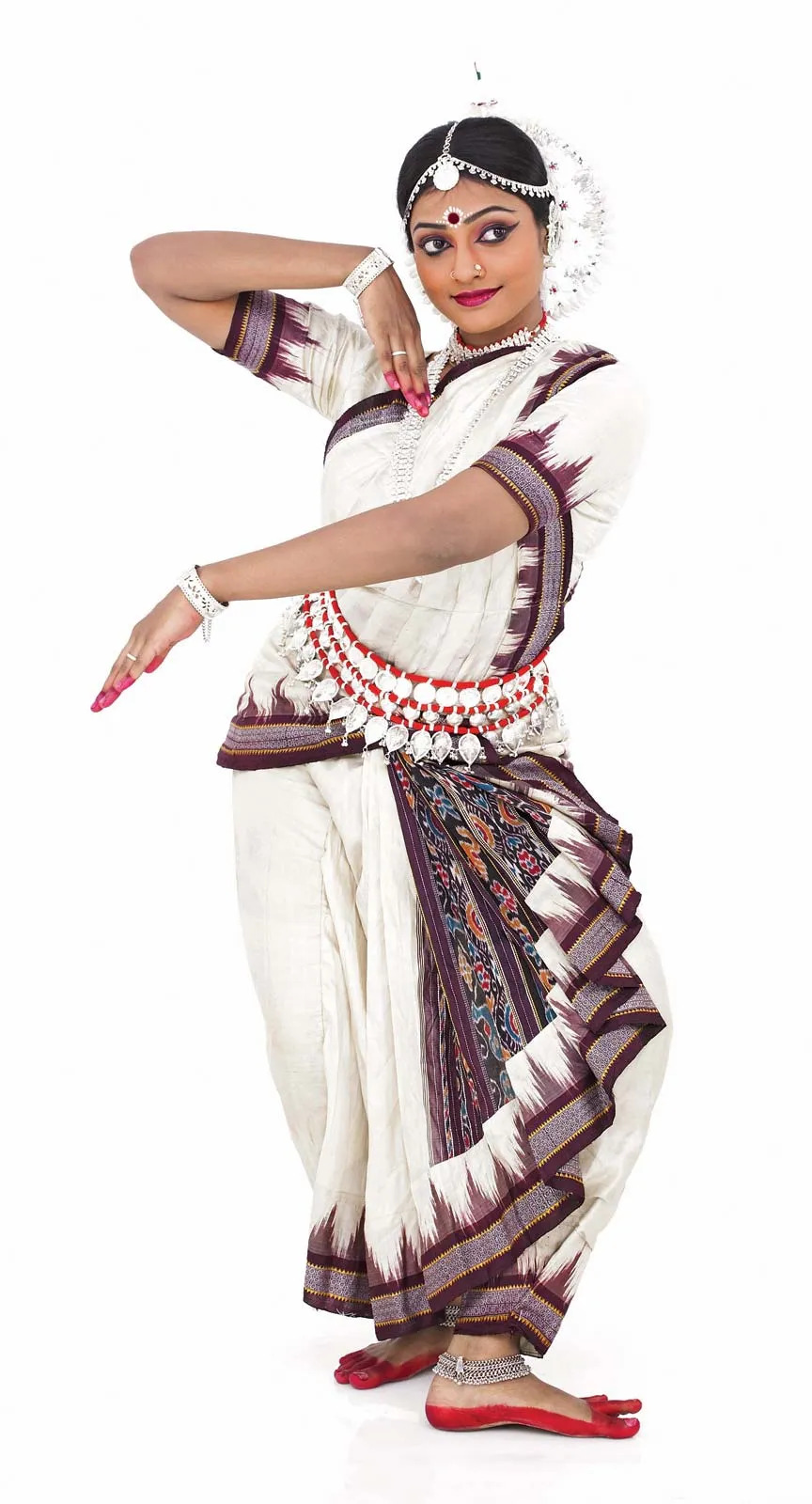
Dancer performing Indian classical odissi dance.
Odissi is indigenous to Orissa in eastern India. It is predominantly a dance for women, with postures that replicate those found in temple sculptures. Based on archaeological findings, odissi is belived to be the oldest of the surviving Indian classical dances. Odissi is a very complex and expressive dance, with over fifty mudras (symbolic hand gestures) commonly used.
Kuchipudi
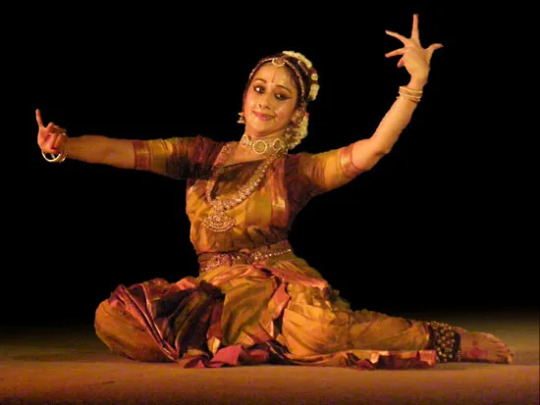
Kuchipudi performance.
Unlike the other styles mentioned, kuchipudi requires talent in both dancing and singing. This dance, from the state of Andhra Pradesh in southeastern India, is highly ritualized, with a formalized song-and-dance introduction, sprinkling of holy water, and burning of incense, along with invocations of goddesses. Traditionally the dance was performed by men, even the female roles, although now it is predominantly performed by women.
Manipuri

Manipuri-style performance of Indian classical dance.
Manipuri comes from Manipur in northeastern India. It has its roots in that state’s folk traditions and rituals, and often depicts scenes from the life of the god Krishna. Unlike some of the other, more rhythmic dances, Manipuri is characterized by smooth and graceful movements. Female roles are especially fluid in the arms and hands, while male roles tend to have more forceful movements. The dance may be accompanied by narrative chanting and choral singing.
Kathak

Kathak school dancer, in Mughal costume, performing Indian classical dance.
A dance of northern India, Kathak is often a dance of love. It is performed by both men and women. The movements include intricate footwork accented by bells worn around the ankles and stylized gestures adapted from normal body language. It was originated by Kathakas, professional storytellers who used a mixture of dance, song, and drama. Like other Indian dances it began as a temple dance, but soon moved into the courts of ruling houses.
Kathakali

Kathakali dance
Kathakali comes from southwestern India, around the state of Kerala. Like bharatanatyam, kathakali is a religious dance. It draws inspiration from the Ramayana and stories from Shaiva traditions. Kathakali is traditionally performed by boys and men, even for female roles. The costumes and makeup are especially elaborate, with faces made to look like painted masks and enormous headdresses.
Bharatanatyam

Bharatanatyam performance
Bharatanatyam is a dance of Tamil Nadu in southern India. It traces its origins back to the Natyashastra, an ancient treatise on theatre written by the mythic priest Bharata. Originally a temple dance for women, bharatanatyam often is used to express Hindu religious stories and devotions. It was not commonly seen on the public stage until the 20th century. The dance movements are characterized by bent legs, while feet keep rhythm. Hands may be used in a series of mudras, or symbolic hand gestures, to tell a story.
6 Classical Dances of India | Britannica
35 notes
·
View notes
Text
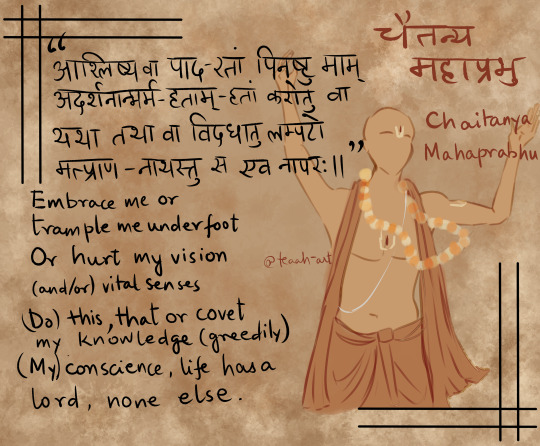
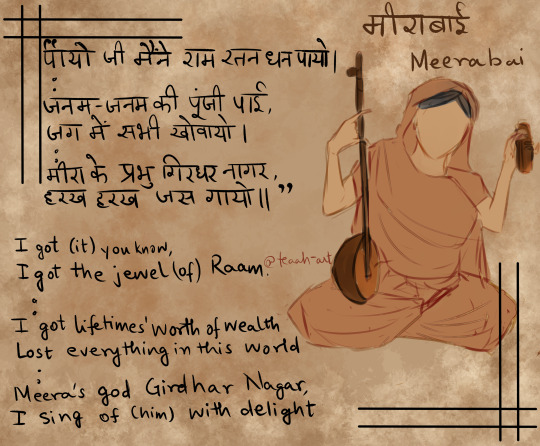
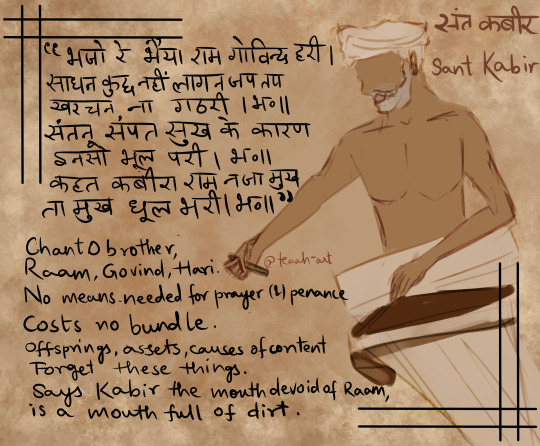
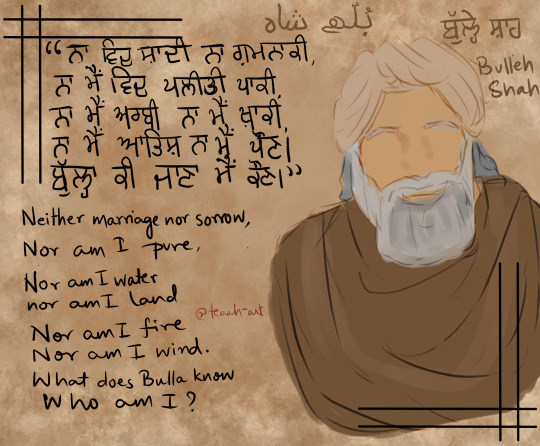
Desi LGBT Fest 2023 (hosted by @desi-lgbt-fest)
Day 7 : Faith/Rituals of Love
Definitely geared heavily towards the 'Faith' part of this prompt as soon as I read it!
If being Queer is defying conventions and if being a part of the Queer community means going against heteronormativity and gender conformity, is it not Queer to forego materialistic ties and the love of a human partner and embrace the love of a greater being you have only heard about in stories?
All four individuals featured here were integral part of the Bhakti Movement and/or Sufism in South Asia. None were married other than Meerabai.
(Panel order from top to bottom)
Chaitanya Mahaprabhu (1486-1534) : A key name of the Bhakti Movement and the Gauriya Vaishnav tradition in 15th Century Bengal, Chaitanya Mahaprabhu was believed to have been a vessel for both Radha and Krishna. Bengali doesn't use pronouns or gendered language and we may never know what they would have preferred to be identified as in a language they didn't know (English), I will simply resort to using They/Them for them. Their written teachings are few and far between but the verse mentioned here is the seventh verse of the only written record of their teachings, the Shikshastakam - a collection of 8 total verses. The translation here is my own and quite literal so that the interpretation is left to the reader.
Meerabai (1498-1597) : [CW : IMPLIED QUEERPHOBIA/APHOBIA] Meerabai was born into Rajput royalty and was married off, also to Rajput royalty, in likely an arranged marriage. While most of the stories surrounding her are folklore whose historicity is yet to be confirmed, her marital status can be confirmed, and so can her devotion and affection for Krishna and the divine, which she has herself penned in numerous poems and songs. Folklore does strongly imply that she was non-committal to her marriage and that her in-laws tried to poison her to death multiple times for it.
Kabir (1398–1448 or 1440–1518) : Found as an orphan by a Muslim weaver couple, Kabir's religion grew to become somewhat of an enigma for future generations. His stance, however, on the topic romance and marital relationships is quite clear - he looked down upon them and a huge chunk of his couplets strongly imply that romantic and sexual relations simply obstruct spiritual enlightenment.
Bulleh Shah (1680-1757) : Bulleh Shah, though an ardent proponent of loving the divine, was declared a Kafir, a non-believer/non-Muslim by a quite a few Muslim clerics of the time. He was known for speaking up against existing power hierarchies of the time and used vernacular speech for his writings (Punjabi, Sindhi) which not only served to popularize his works, but also let people connect to his words.
A personal note on my motivations under the cut.
A while back when I was actively going through the anxiety of finding out that I am ace and that I will never fit into the current South Asian society that the wedding industry has a chokehold on, I desperately wanted to see people from my own culture living happily without a partner. During one of my history rabbit hole escapedes, I restumbled upon the story of Meerabai, how she always insisted on loving and devoting herself towards Krishna, despite being married into a normative and wealthy household and despite her in-laws repeatedly attempting to poison her for not committing to her husband. Most of us from India grow up hearing about Meerabai, her spiritual connections to Krishna, and her struggles. The moral of those stories is always framed as 'believe in god, he will help you through tough times'. But this was the first time I was making a different connection, I was drawing different morals. And when I took Meerabai's non-conformity to her married life and started looking for more examples like hers, I was overwhelmed by how many more individuals existed without a partner, condemned being in a normative, married relationship, admitted to having lost human connections and faced resistance even, and yet stayed true to their orientation and sounded HAPPY! It was extremely hard to narrow it down to these four, but these do make my point! Labels are hard to transpose across cultures and history. But if being queer means being nonconforming of marital structures and being aspec/arospec implies neutrality, indifference, or aversion to romance and intercourse, then no one fits the label if they don't.
#desilgbtfest23#desi lgbt#desi lgbtq fest#long post#pride 2023#pride#original art#my art#meerabai#meera bai#sant kabir#kabir#kabirdas#bullehshah#bulleh shah#chaitanya mahaprabhu#bhakti movement#sufism#sufi#tw implied aphobia#tw mild aphobia#tw implied homophobia#btw if someone notices errors in my Shahmukhi or Gurumukhi on the Bulleh Shah illustration pls let me know#I do not speark or read or write Punjabi and I copied
82 notes
·
View notes
Text
There is no KHMK in Ba Sing Se
(Or, the one in which Shyama is back with another fascinating show!)
This show is by Ekta Kapoor so I never had any expectations
Ft. Star-studded cast!
The show begins with .....a crying Yudhishthira? Plz, he never cried while this...whole thing-
wait, is this the game of dice
Also, Shakuni is bald
the headpiece is weird as fook
Cannot believe that they are playing this whole game in the backdrop of something that lowkey looks similar to the work done in the Taj Mahal #Mughal-Kuru bhai-bhai?
andddd a scene with the Pandavas.....CHESTS?! wtf is this asheelta going on-
Bhima is standing as if he needs to poop, tbh
ANDDD Draupadi has the 2000s lip gloss smeared across her lips.
And she has clumsily spilt sindoor. #dhumtanana
weird bg, tbh
Shakuni is cackling like a witch
actually, none of the shows show the game of dice as per the books, but still, it isn't as weird as this
Yudi is shedding crocodile tears. Pls, if u regretted this so much, you would have done something to stop this. tbh, the only acceptable version of Yudi was presented by StarBharat.
Draupadi: "Usne mujhe chhua"
"Sasur", "Bhaiya", and "Guru Ji". Also, why is Drau calling them by their names?!
"Maang ke sindoor ko bikhera hai"
Draupadi has a tattoo #do rupees ki pepsi
The Pandavas have random sanskrit stuff and OM tattooed wtf
The whole praja is watching this wtf
"Mere bhaiya ko andhi bolne waali aaj khud andhi ho gayi"
er...didn't Bhima say so many things during this whole sequence? Has he lost his voice?
Dushasan is saying that a woman is just an object for a man.
Why are the dialogues that belong to Karna given to Dushasan?
Polyandry was not unheard of, tbh.
"Tu Panchali nahi, tu Pehli hai" someone explain me the meaning of this dialogue T-T
Draupadi wasn't the first to be married to multiple men. Ever heard of the Ashwini Kumars and their wife Usha?
"Rajshahi vastra" eh....you mean the chiffon saree she is draped in? No seriously, it is a saree with 0 work done on it-
Yada Yada the trap remix
Duryodhan is giving the order to disrobe Draupadi. Oh God.
ANDD KRISHNA'S THEME SONG IS....OM JAI JAGDISH HARE?!
A saree is coming out of the sudarshan chakra, and this saree shall cover Draupadi.
Why was she screeching so much? My ears are goners.
*Sigh* we end with Vyasa contemplating suicide and some rishi (is that Brahma?!) stopping him
22 notes
·
View notes
Text
Day 1 - Shiva
Race: Fury
Alignment: Light-Chaos
March 20th, 2024
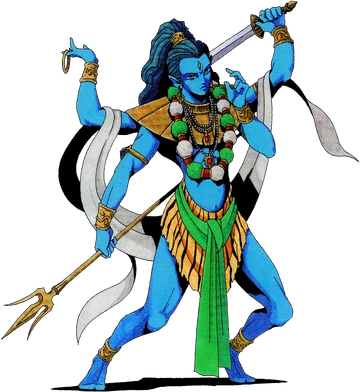
Today’s Demon Spotlight is Shiva from Hinduism, the destroyer who breaks for more to create. One of the primary deities in Hindu Mythology alongside Vishnu and Brahma, Shiva serves a very unique purpose- he’s worshiped as someone who participates in a cycle of life and rebirth, the god who destroys so more can be created by Brahma. As such, he’s far from inherently evil, and is actually one of the most worshiped in the Trimurti. There is a lot to Hinduism, and admittedly I’m not very knowledgeable about it, but Shiva’s role in it has always caught my interest, and has actually inspired quite a bit of my own work- he’s actually the chief inspiration for Nil!
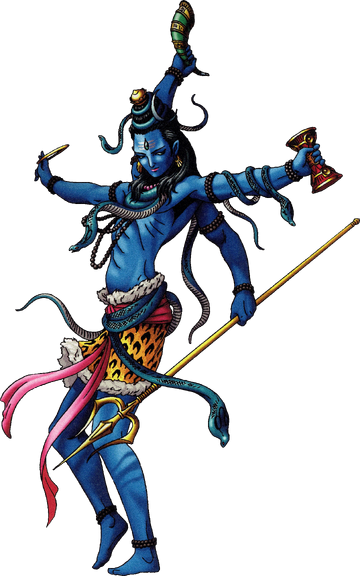
In the Megami Tensei games, Shiva serves as a very powerful demon in almost all of them, appearing at very high levels and even serving as a superboss in V. Design wise, there isn’t much to say- he’s rather accurate in all incarnations, what with his blue skin, four arms, and dancer-like attire. His theme song in V, the trippy, almost acid-like song Battle -Destruction- has a rambling, choppy beat fronted by spacey sounding instruments and percussion that gives way to a surreal and oppressive atmosphere, one incredibly fitting for his boss fight in V given his deific role. The bizarre time signature and vocals make it feel like a waltz, which is incredibly fitting given how Tandava is literally just him busting a move. Speaking of which…
His signature skill, ‘Tandava,’ actually originates as a divine dance performed by him in the mythology, likely being what inspired quite a lot of depictions of him as a belly dancer. The Tandava is the method by which Shiva carries out his destruction to reshape the world, a dance so filled with fervor that it represents the eternal cycle of creation, preservation, and destruction. There are several types of this dance, those being “Ananda Tandava, Tripura Tandava, Sandhya Tandava, Samhara Tandava, Kali (Kalika) Tandava, Uma Tandava, Shiva Tandava, Krishna Tandava, and Gauri Tandava.” Each of them represent both different gods and different parts of the cycles in Hinduism, and the one that Shiva himself performs most often (and thusly is named after him) is described as being the originator of the cycle in the first place. In the Megami Tensei games, the Tandava dance depicted appears to be either Rudra Tandava or Shiva Tandava, both of which representing his destruction, though I personally lean more towards it being Rudra Tandava, as the move is a severe almighty attack that destroys all foes on screen.
Overall, Shiva is one of my favorite demons in the series on account of his design, gameplay, and lore. He’s one of the most interesting mythological figures in history in my opinion, and SMT does him justice.
#shin megami tensei#smt#persona#smt v#smt iv#smt nocturne#megaten#daily#one of my favorite demons in the entire series ngl#his design is great#his theme is a banger#and his lore is incredibly interesting to me#i really gotta learn more about hindu mythology ngl
16 notes
·
View notes